Couple Inherits, Promotes Tasty Art
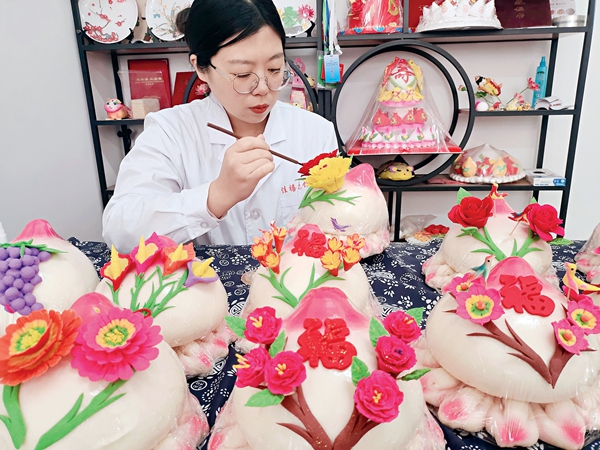
Huamo, which means flower-shaped steamed bun, is known for its exquisite design and artistic modeling. Han Tongtong and her husband, Dong Jixin, run a huamo studio in Shijiazhuang, capital of north China's Hebei Province. During recent years, they have promoted the art form of crafting huamo; as such, they have enabled an increasing number of people to appreciate its charm.
Huamo has a long history in several regions of China, including Shandong, Shanxi and Shaanxi provinces. Whenever celebrations or major events are held in those regions, the locals craft huamo to create a festive atmosphere, and they give huamo to relatives and friends to convey their best wishes. In 2008, huamo was added to the list of items of national intangible cultural heritage.
Han was born in Yantai, a city in Shandong Province. Han's mother is skilled at making huamo, in various shapes. When Han was young, she was greatly influenced by her mother. "One year, my mother made a monkey and a full moon with dough during the Mid-Autumn Festival. My sister and I went out to play with the 'monkey and moon.' I felt proud when our little friends all admired our vivid steamed buns," recalls Han.
Since then, Han has been interested in huamo. As a child, she learned from her mother how to make various shapes of steamed buns.
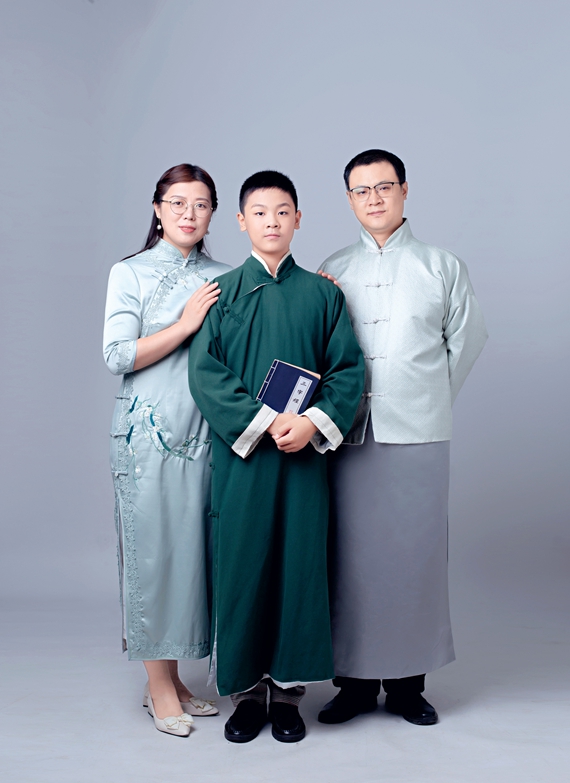
Family Support
In 2005, Han enrolled in Shandong University of Art and Design. She met Dong at the university. "Dong is a steady, responsible person. He is respectful to his parents," says Han.
Han and Dong wed in Shijiazhuang in 2011. She gave birth to their son, Dong Yihan, the next year. "Living in harmony and mutual respect and love are the basis of family happiness. Our family is a harmonious, happy family of three," Dong Jixin says. In 2015, Han and Dong Jixin established a huamo studio in Shijiazhuang. Initially, the couple was confident about their careers. They perfected the shapes of huamo products, and they made birthday-cake-shaped huamo, in a creative way. However, they encountered a major setback.
"At that time, not many customers knew about huamo. For them, it was only a steamed bun. They preferred cream cakes. Our workshop was not profitable. I felt defeated, and I wanted to give up," recalls Han. However, Han's son and husband were supportive. "Huamo products are tasty and good-looking. I like eating them. More children will like them in the future. Let's hang in there," Dong Yihan told his mother. His simple words warmed Han's heart.
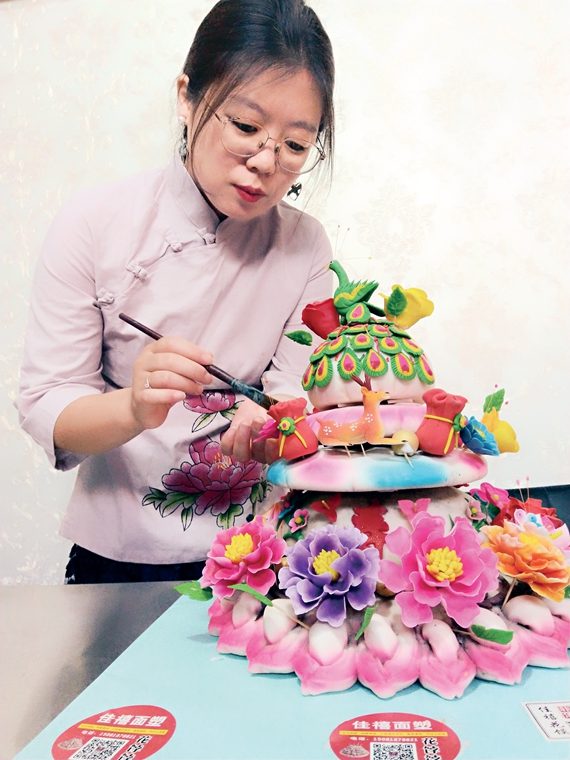
Dong Jixin encouraged Han to use various methods and channels to promote huamo and its history. "I believe our business will become better if we promote huamo to more people. As we chose to start the business, we must do it well. We will encounter more difficulties in the future, so we must become strong," said Dong Jixin.
Han and Dong Jixin often study plants and animals when they are enjoying the outdoors, and they look at those plants and animals for inspiration to make huamo products. When Han researches and develops new huamo products, especially late at night, Dong Jixin always accompanies her.
Han makes huamo products with quality flour, eggs, honey, peanut oil and other raw materials, and she mixes the dough with fresh fruit juice and/or vegetable juice. As such, the products are more nutritious, and their colors look better. Such huamo products are popular with children and the elderly.
"At the beginning, we encountered many problems. Whenever I hesitated to continue the business, my husband would support and encourage me, and he helped me regain my confidence. So, I could always make bold innovations in the shapes of huamo products," recalls Han. "I think a good marital relationship involves making progress together, supporting each other, and managing the small family together," Han concludes.
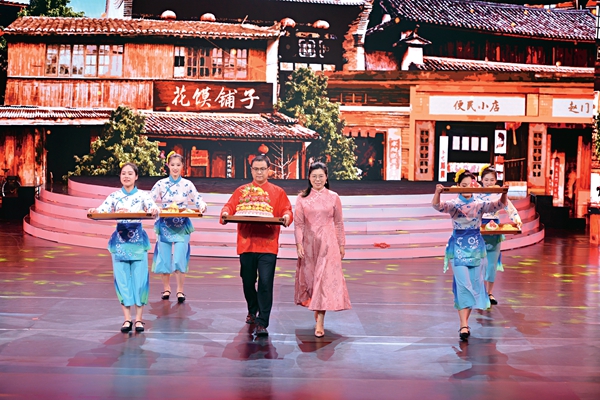
Responsibilities
In 2020, Han and Dong Jixin's huamo artwork won the Excellence Award during the Second Cultural Products and Tourist Commodity Competition in Shijiazhuang. In 2022, as representatives of Hebei Province, they participated in the National Dough Modeling Exhibition. Their excellent artworks were added to the permanent collection of the organizing committee.
Han and Dong Jixin believe they must shoulder the responsibility of inheriting the art of crafting huamo, and also of passing the craft down to future generations. They also believe they must shoulder the responsibility of promoting huamo among average people. To accomplish that, they work as part-time teachers in some schools in Shijiazhuang. They teach the students how to make huamo, and they cultivate students' interest in huamo. They also participate in competitions, exhibitions, lectures and activities to promote the age-old art form.
In 2020, Han and Dong Jixin began teaching huamo-making skills via a livestreaming platform. They have since trained more than 1,000 people, and they have helped more than 500 women either find work making huamo or start huamo-making businesses. "More and more people have been learning how to make huamo. I hope more people will appreciate the charm of this traditional art form," Han says.
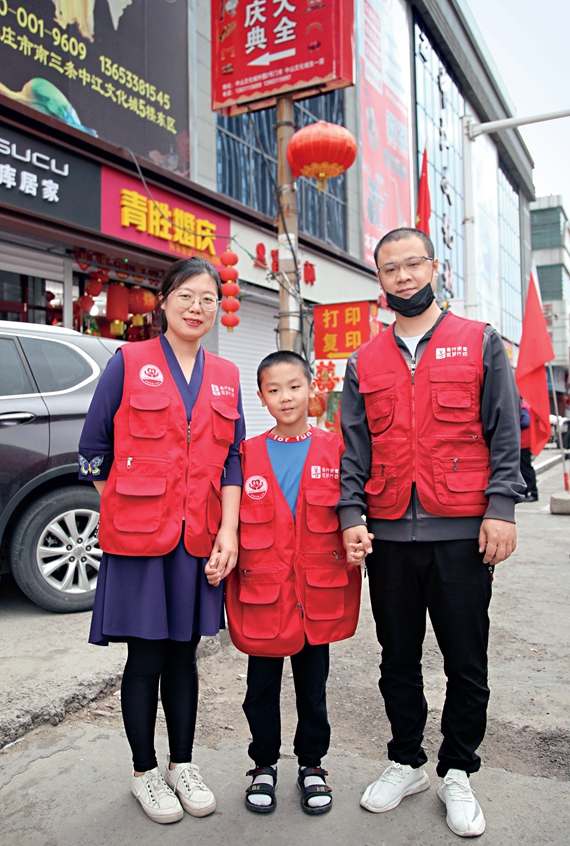
Good Example
Han and Dong Jixin think parents should set a good example for their children, and they believe parents' words and deeds can deeply influence their children. They often participate in public-welfare activities. Under their influence, Dong Yihan often participates in volunteer activities organized for children. In May 2023, Han's family was selected a National Most Beautiful Family.
"Family education is not merely imparting academic knowledge to children. What is more important, parents should teach their children how to be good people. We hope our son will become a person who masters professional skills, through which he can earn his own living, and we hope he will contribute to society and the country," Han concludes.
Photos from Interviewees
Sources: Department of Family and Children's Affairs of the ACWF
(Women of China English Monthly May 2024)
Please understand that womenofchina.cn,a non-profit, information-communication website, cannot reach every writer before using articles and images. For copyright issues, please contact us by emailing: website@womenofchina.cn. The articles published and opinions expressed on this website represent the opinions of writers and are not necessarily shared by womenofchina.cn.








.jpg)

 WeChat
WeChat Weibo
Weibo 京公网安备 11010102004314号
京公网安备 11010102004314号